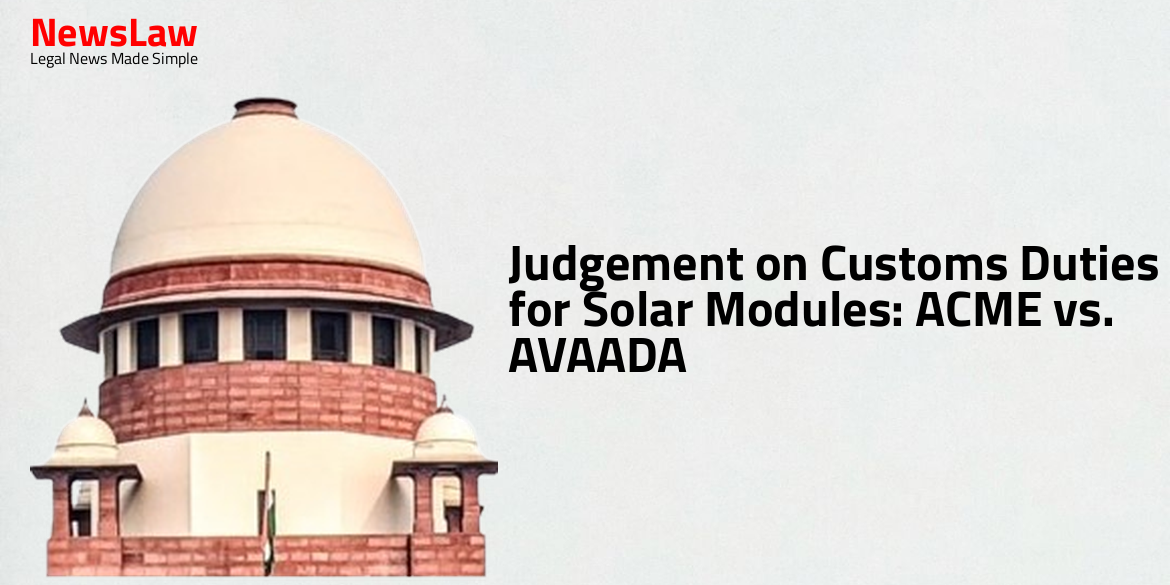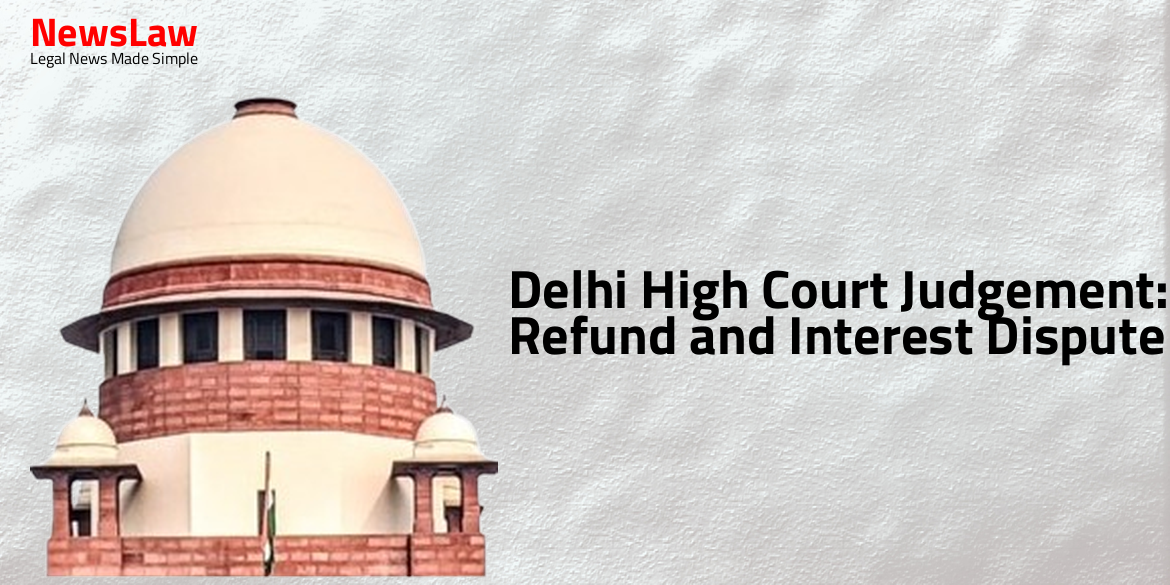In a significant ruling by the Delhi High Court, the case of ACME and AVAADA sheds light on customs duties related to solar modules. The judgement delves into the interpretation of Sections 61 and 65 of the Customs Act, impacting the import and warehousing of solar power equipment. Stay tuned to learn more about this crucial legal development.
Facts
- The Facilitation of Advance Rulings Cell (FAC) has been established under Section 28F of the Customs Act, 1962.
- The FAC provides a platform for resolving doubts or disputes in relation to the classification of goods, valuation, or the applicability of notifications issued under the Act.
- The FAC consists of one or more members appointed by the Board, including a Chairman who is an officer of the Board.
- The FAC is required to pass reasoned orders after examining the application and hearing both the applicant and the concerned officers.
- The decisions of the FAC are binding on the principal Commissioner of Customs or Commissioner of Customs, subject to certain exceptions.
- The FAC is intended to provide a quick and efficient mechanism for addressing issues related to the customs laws and procedures.
- The creation of the FAC underscores the importance of clarity and consistency in the interpretation and application of customs laws.
- Imposition of BCD in 2022-23 led to a reduction in imports overall
- However, there was an increase in import of solar modules in 2023-24
- The data on import of solar modules is represented in the chart provided
Issue
- The main issue to be examined is whether the Circular can be considered a revenue legislation for imposing excise duty.
- It needs to be determined if the suits in question relate to the recovery of possession of immovable property in Greater Bombay.
- The scope and application of Section 37B of the Act needs to be understood in the context of the case.
- The first key issue is whether the dominant purpose test or the theory of apportionment applies to interpreting Section 14-A of the Act.
- The interpretation of the phrase ‘in relation to’ is crucial, especially in a scenario where dividend income is earned from shares not primarily acquired for that purpose.
Arguments
- The petitioner argued that the grant of a license under the MOOWR Regulations is a judicial act.
- The petitioner contended that the cancellation of the license was invalid and void as it was not preceded by the opportunity to avail of alternative remedies.
- The petitioner emphasized the importance of following statutory provisions in determining breaches of license conditions.
- The petitioner highlighted that the duty to act judicially imposes the obligation to act impartially and independently.
- The petitioner challenged the Instruction mandating the cancellation of all licenses for solar generation units as it impeded the statutory discretion of the Customs authorities.
- The petitioner argued that solar panels and cells imported for generating solar energy should qualify as capital goods under Section 65 of the Act.
- The petitioner contended that the MOOWR Regulations were intended to defer duty payment until goods are cleared for home consumption.
- The petitioner emphasized the need for natural justice and providing opportunities for license holders to defend against breach allegations before license cancellation.
- The petitioner critiqued the allegation of circumventing duty payments by importing goods at a time they were duty-free.
- The petitioner argued that the instruction contravenes Section 151A of the Act by interfering with the discretion of Customs officials.
- Mr. Ghosh, senior counsel for ACME and AVAADA, questioned the interpretation of Sections 61 and 65 of the Act presented by the ASG.
- He argued that the period for which solar panels and modules can be retained in a warehouse is governed by Section 61(1)(a) of the Act, and the duty is deferred until their clearance.
- The only qualifying criteria under Section 65 is that manufacturing processes or operations must be related to the warehoused goods.
- The counsels addressed submissions on the validity of the Instruction and the larger question of whether solar power generation falls under the permissible activities of Section 65 of the Act.
- They argued that the Act and MOOWR Regulations do not exclude solar power generation from their ambit, and the respondent’s stance is untenable.
- Mr. Ghosh highlighted that if an authority’s power is quasi-judicial, it cannot be controlled by directives.
- He emphasized a distinction between ‘in manufacture of’ denoting direct participation and ‘in relation to’ suggesting indirect involvement.
- Mr. Ghosh also noted a cancellation of a license in a related case and asserted that the Instruction misinterprets Sections 61 and 65 and MOOWR Regulations.
- He further contested the understanding of the phrase ‘in relation to such goods’ and argued that the respondents’ interpretation of Section 65 is incorrect.
- The submission concluded that capital goods can remain warehoused till clearance, contrasting with other goods which must be consumed or cleared from the warehouse.
Analysis
- Licensees are required to remove goods from the warehouse for export after filing a shipping bill or bill of export and affixing a one-time-lock to the means of transport.
- The licensee must record the goods that are removed from the warehouse.
- Goods cleared from a warehouse for home consumption must have a bill of entry presented, and duty must be paid.
- For goods not cleared, warehoused, or transhipped within thirty days, permission is required for further action.
- Chapter VII of the Act deals with the clearance of imported and exported goods.
- The Act allows for manufacturing and other operations in a warehouse with proper permissions.
- The Board has the power to issue orders for achieving uniformity in the classification of goods and levy of duty.
- Regulations provide guidelines for operating under specific conditions in a warehouse.
- Goods may remain in the warehouse for a specified period based on their classification.
- The Act provides for interest payments on warehoused goods beyond certain time limits.
- Conditions and qualifications are specified for operating under the regulations.
- The Act empowers the Principal Commissioner of Customs or Commissioner of Customs to grant permission for operations in a warehouse.
- The Act specifies the procedure for removal of resultant goods for home consumption or export.
- The court emphasizes the importance of interpreting statutory provisions based on their literal construction.
- There is a detailed discussion on the interpretation of the term ‘relating to’ in a specific case.
- The judgement highlights the significance of the legislature’s clear intention and the need to adhere to unambiguous statutory language.
- Instances are provided where courts may depart from literal interpretation to avoid absurdity or inconsistency.
- The principle of giving effect to clear legislative language, even if it leads to undesired results, is reiterated.
- The court’s duty is seen as interpreting and applying the law rather than changing it to meet subjective views of justice.
- The judicial responsibility to choose a construction that aligns with legislative purpose is underlined.
- Referenced cases illustrate the courts’ restraint in judicial legislation and their focus on upholding statutory intent.
- The role of quasi judicial authorities is discussed with an emphasis on avoiding influence from administrative considerations or directives.
- The context of circumventing policy objectives through judicial decisions is explored, highlighting the boundaries judges must adhere to.
- Recreating or reassembling Section 65 to exclude a particular category of activity based on negative impact is wholly incorrect.
- Provisional bond demand for release of goods raised in W.P. (C) 12386/2022 is noted.
- The court cannot justify deploying principles of purposive interpretation to correct projected anomalies in solar power generation as per permissions under Section 65.
- Policy issues related to impact on local generators or distortion of ‘level playing field’ are not within the court’s scope for statutory interpretation.
- Introducing ineligibility conditions under the guise of statutory interpretation is not justified.
Decision
- The impugned Instruction dated 09 July 2022, mandating review of existing licenses and follow-up action, is quashed.
- Detailed orders were passed on 04 August 2023 in C.M. 36603/2023 (Application for Directions).
- The stay on the impugned show cause notice (SCN) was confirmed and made absolute on 26 August 2022.
- The present writ petitions are allowed.
- No further observations are deemed necessary.
- The respondents in W.P. (C) 10838/2022 have an unsustainable position based on the conclusions above.
- The SCN was challenged through an amendment application leading to the P. FINAL DETERMINATION 180.
- W.P.(C) 12386/2022 shall stand at 179.
- The parties are directed to proceed as per the issued directions in this batch.
Case Title: ACME DEOGHAR SOLAR POWER PRIVATE LIMITED Vs. CENTRAL BOARD OF INDIRECT TAXES AND CUSTOMS & ANR. (2024:DHC:3615-DB)
Case Number: W.P.(C)-10836/2022



